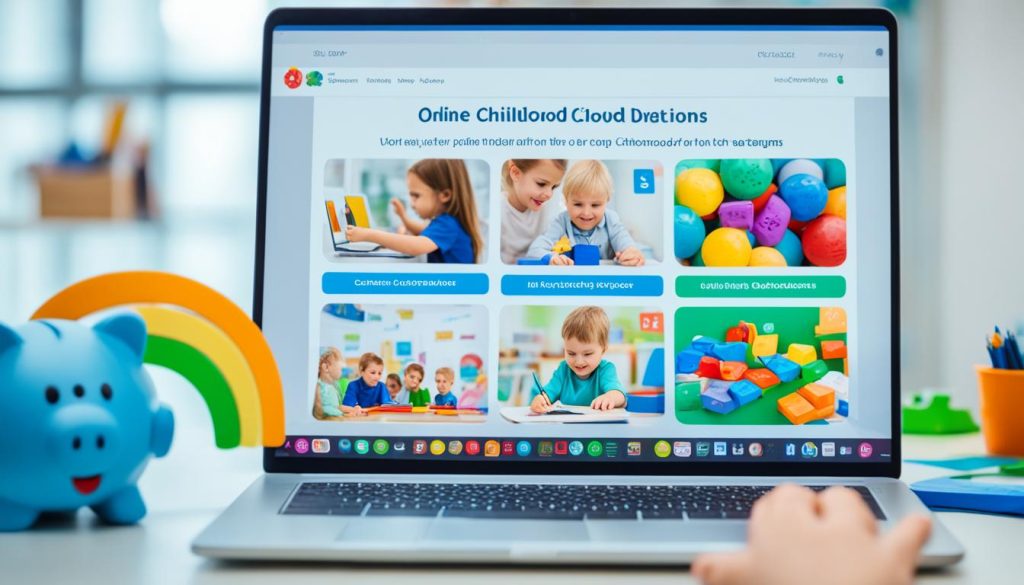Early childhood education plays a crucial role in the development of young children from birth to age eight. As the demand for early education professionals continues to grow, online schools for early education have emerged as a convenient and flexible option. These virtual schools provide aspiring educators with the opportunity to pursue accredited online degrees in early childhood education, offering a range of benefits including cost-effectiveness, flexibility, and access to a wider selection of schools.
Distance learning for early education has become increasingly popular, enabling students to earn their degrees from the comfort of their own homes. Online universities for early education offer programs that cover a wide range of subjects, including child development, teaching methods, and curriculum design. Through a combination of interactive coursework and practical experience opportunities, students gain the knowledge and skills needed to excel in the field of early childhood education.
Key Takeaways:
- Online schools for early education provide a convenient and flexible option for aspiring educators.
- These virtual schools offer accredited online degrees in early childhood education.
- Distance learning allows students to earn their degrees from home.
- Online universities for early education cover a range of subjects, including child development and curriculum design.
- Practical experience opportunities are available to enhance learning.
Online Early Childhood Education Programs
Online early childhood education programs offer a convenient and flexible option for individuals interested in pursuing a career in early childhood education. These programs typically award a bachelor of arts (BA) or bachelor of science (BS) degree, providing students with the necessary knowledge and skills to work with young children.
The coursework in online early childhood education programs is designed to cover a wide range of subjects relevant to the field. Students can expect to study topics such as:
- Child development and psychology
- Classroom management strategies
- Teaching methods
- Curriculum design
- Language development
These courses are designed to provide a strong foundation in early childhood education and prepare students for the challenges and rewards of working with young children.
Many online programs also offer specializations or concentrations that allow students to focus their studies in specific areas of interest. For example, students may have the opportunity to specialize in early childhood special education or administration and leadership within the field of early childhood education.
When choosing an online early childhood education program, there are several factors that prospective students should consider:
- Accreditation: It’s important to ensure that the program is accredited by a recognized accrediting body. Accreditation ensures that the program meets certain quality standards and that the degree earned will be recognized by employers.
- Learning experience: Online learning requires self-discipline and motivation. Prospective students should consider the format of the program, whether it offers synchronous or asynchronous courses, and the level of support and resources available to online students.
- Specialization options: Some online programs offer specialized tracks or concentrations that allow students to focus their studies in a particular area of interest. Prospective students should explore the specialization options available and choose a program that aligns with their career goals.
- Licensure requirements: Depending on the state in which students plan to work, certain positions within the field of early childhood education may require licensure. Prospective students should research the licensure requirements in their state and choose a program that meets those requirements.
By considering these factors, prospective students can choose an online early childhood education program that best fits their individual needs and goals.
| Benefits of Online Early Childhood Education Programs | Challenges of Online Early Childhood Education Programs |
|---|---|
| Flexible scheduling options allow students to balance their studies with other commitments. | Online learning requires self-motivation and discipline to stay on track with coursework. |
| Access to a wide range of online schools and programs, offering more opportunities for enrollment. | Limited face-to-face interaction with instructors and peers, which may impact the learning experience. |
| Cost-effective option compared to traditional on-campus programs. | Technical difficulties or issues with internet connectivity can disrupt online learning. |
| Accelerated or self-paced options available, allowing students to complete the program at their own pace. | Less hands-on practical experience compared to in-person programs. |
Career Opportunities in Early Childhood Education
With a bachelor’s degree in early childhood education, graduates have a wide range of career opportunities in this rewarding field. Here are some of the exciting paths you can pursue:
Preschool Teacher
Become a preschool teacher and play a vital role in shaping the minds of young learners. As a preschool teacher, you will create a nurturing environment and implement engaging activities to help children under the age of five develop crucial skills in subjects like reading, writing, and social interaction.
Kindergarten Teacher
Take on the important task of guiding children as they start their formal education. As a kindergarten teacher, you will introduce foundational knowledge in subjects such as math, science, language arts, and social studies. You will foster a love for learning and provide the foundation for future academic success.
Elementary School Teacher
As an elementary school teacher, you will have a lasting impact on children’s educational journey. You will teach multiple subjects to students in grades one through five, helping them develop a strong academic foundation and essential life skills. Your passion for education will inspire young minds and ignite a love for learning.
Teaching Assistant
Play a supportive role in the classroom as a teaching assistant. Under the supervision of licensed teachers, you will provide instruction and support to young children, helping them grasp important concepts and reinforcing classroom lessons. Your dedication and guidance will contribute to their educational development.
Preschool Director
Guide the overall operations of a preschool or childcare center as a preschool director. You will oversee curriculum development, ensure compliance with regulations, manage staff, maintain a safe environment, and foster positive relationships with families. Your leadership skills will shape the educational experience of young children.
These are just a few examples of the many fulfilling careers in early childhood education. Each role offers unique opportunities to make a difference in the lives of young children and contribute to their growth and development.
| Career | Responsibilities | Qualifications |
|---|---|---|
| Preschool Teacher | Create a nurturing learning environment Plan and implement age-appropriate activities Assess and monitor children’s progress |
Bachelor’s degree in early childhood education or related field State licensure or certification may be required |
| Kindergarten Teacher | Teach foundational subjects such as math, science, language arts, and social studies Develop lesson plans Evaluate student performance |
Bachelor’s degree in early childhood education or elementary education State licensure or certification required |
| Elementary School Teacher | Instruct students in multiple subjects Plan and deliver lesson plans Assess and evaluate student progress |
Bachelor’s degree in elementary education State licensure or certification required |
| Teaching Assistant | Assist in delivering instruction to students Provide one-on-one support to students Collaborate with teachers to develop lesson plans |
High school diploma or equivalent Certification or training may be required |
| Preschool Director | Oversee daily operations of a preschool or childcare center Manage staff and curriculum development Ensure compliance with regulations |
Bachelor’s degree in early childhood education or related field Management experience preferred |
Embark on a fulfilling career in early childhood education and make a positive impact on the lives of young learners.

Choosing the Right Online ECE Program
When it comes to choosing an online early childhood education (ECE) program, several factors should be considered to ensure the best educational experience. Accreditation, learning experience, specialization options, and the licensure track are crucial aspects that can greatly impact your journey as an ECE professional.
Accreditation: Ensuring Academic Quality
Before enrolling in any online ECE program, it’s essential to verify the accreditation status of the institution. Institutional accreditation guarantees that the school meets established academic quality standards. Additionally, programmatic accreditation from reputable organizations such as the National Association for the Education of Young Children (NAEYC) ensures that the specific ECE program adequately prepares students for their future roles as educators.
Learning Experience: Synchronous or Asynchronous?
Consider the learning format of the online program. Some programs offer synchronous courses, which require students to attend classes at specific times, promoting real-time interaction and engagement. On the other hand, asynchronous programs allow students to access course materials and complete assignments at their own pace. Determine which format aligns best with your learning style and schedule.
Specialization Options: Broadening Your Expertise
Exploring the variety of specialization options offered within an online ECE program can enhance your career prospects and cater to your specific interests and goals. Whether you have a passion for early childhood special education, administration and leadership, or other areas within the field, choosing a program that aligns with your desired specialization is crucial for personal and professional growth.
Licensure Track: Meeting State Requirements
Consider whether the online ECE program offers a licensure or non-licensure track. If your goal is to obtain licensure and work as a certified ECE professional, ensure that the program aligns with the licensing requirements in the state where you plan to practice. Verify that the program prepares you for any necessary exams or additional steps required for licensure.
By carefully considering accreditation, learning experience, specialization options, and licensure track, you can make an informed decision when choosing the right online ECE program. Now, let’s explore the fascinating world of nature-based early childhood education and its benefits.

Exploring Nature-Based Early Childhood Education (NBECE)
Nature-based early childhood education (NBECE) integrates the principles of early childhood education with environmental education, creating a unique approach that emphasizes the benefits of connecting young children with nature. NBECE programs provide valuable opportunities for hands-on learning in natural environments, fostering curiosity, exploration, and a deeper understanding of the world around them.
By incorporating nature into the curriculum, NBECE nurtures children’s physical, cognitive, and emotional development. It allows them to engage with natural elements such as plants, animals, and the changing seasons, fostering a sense of wonder, curiosity, and respect for the environment.
Students studying NBECE can explore a variety of topics, including the history and theories behind nature-based education, the benefits it offers, and the different programs designed to implement it effectively. They can gain insights into the development of nature-based early childhood education curriculum and how it aligns with national educational standards.
One of the challenges in NBECE is assessing and managing the risks associated with outdoor learning. Educators must promote safety without compromising the valuable learning experiences that nature provides. They must also navigate regulations and policies that govern outdoor learning and ensure a balance between structured and unstructured play in natural settings.
Designing and Implementing NBECE
Designing and implementing NBECE involves creating an environment that fosters a deep connection with nature and supports children’s learning and development. Teachers play a crucial role in creating a shared vision and establishing principles for nature-based education within their classrooms.
“Nature is a resource for learning that is freely available to all children. By harnessing its power, we can cultivate a lifelong appreciation for the environment and equip children with the skills they need to become environmentally responsible adults.” – Jane Carter, Early Childhood Educator
Teachers can design nature-based learning experiences that incorporate elements of exploration, observation, and inquiry. They can facilitate activities that promote sensory experiences, promote problem-solving skills, and encourage creativity. By incorporating nature journals, nature walks, and gardening projects, educators can create meaningful connections between children and the natural world.
| Benefits of Nature-Based Education | Risks and Challenges of Nature-Based Education |
|---|---|
|
|
Implementing NBECE requires collaboration and support from stakeholders, including parents, administrators, and the wider community. Creating partnerships with local organizations, parks, and nature centers can enrich the learning experiences and provide additional resources for children to explore and learn from nature.
By embracing nature-based early childhood education, we can foster a deep connection between children and the natural world, instilling a sense of wonder, respect, and responsibility for the environment. Through NBECE, we can shape future generations who are not only knowledgeable but also passionate advocates for the preservation of our planet.

Conclusion
Online schools for early education provide a convenient and flexible option for individuals interested in pursuing a career in early childhood education. These programs offer the necessary skills and knowledge to succeed in the field, while also allowing for specialization and hands-on learning opportunities. Graduates can go on to become preschool teachers, kindergarten or elementary school teachers, teaching assistants, or preschool and childcare center directors.
When choosing an online program for early childhood education, it is crucial to consider factors such as accreditation, learning experience, specialization options, and licensure requirements. Accredited online schools for early childhood education ensure that the program meets the highest educational standards. Additionally, the learning experience should be engaging and interactive, with opportunities to apply knowledge in real-world settings.
Virtual early education programs offer the chance to learn from experienced educators and engage with a diverse group of students from different backgrounds. This online learning approach allows for flexibility in terms of time and location, making it easier for individuals to balance their studies with other commitments. Aspiring educators can explore the possibilities of early childhood education online and embark on a rewarding career that nurtures the minds of our future generations.
Furthermore, nature-based early childhood education is an innovative approach that integrates environmental education into the early childhood curriculum. It offers numerous benefits for both children and educators, such as fostering a love for the natural world, promoting physical activity, enhancing cognitive development, and instilling environmental stewardship. By incorporating nature-based education into online early childhood education programs, students can gain a holistic understanding of how to create meaningful learning experiences that connect children with nature.




No comments! Be the first commenter?